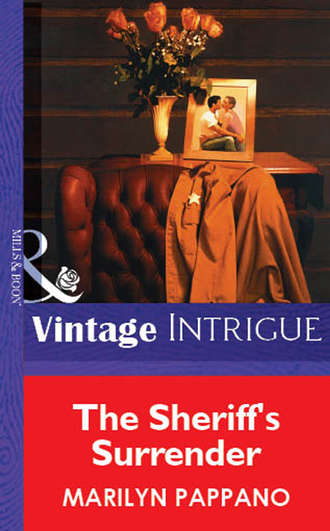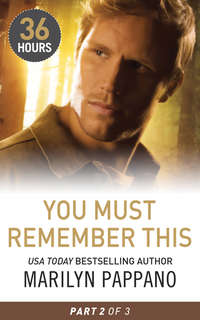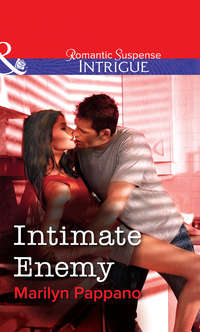
Полная версия
The Sheriff's Surrender
“You can use this room,” he said brusquely. “Bathroom’s next door.” Then he pivoted and returned the way they’d come.
Neely hesitantly entered the room and set her suitcase on the bed. To say the room was decorated would be overly generous. There were no pictures on the walls, no knickknacks scattered across the furniture, no pretty pillows piled on the bed. At best, it was functional. The walls were pale green, the trim white, the carpet a serviceable hunter-green. There were only blinds, no curtains, at the windows. The furniture was antique oak—a bed, dresser, two night tables and an armoire, probably handed down through generations of the Barnett family.
The only antiques she had were handed down, too—just not from her own family. She doubted that a Madison had existed before her and her sisters who could afford or appreciate such treasures.
She didn’t bother unpacking—why, when she would be leaving the next day?—but went to the bathroom next door, then headed back to the kitchen. She’d had only a doughnut and coffee for breakfast and had missed lunch completely. Though it wasn’t long until dinnertime, she needed something to settle the queasiness in her stomach or she would have one more woe to add to her long list.
Reese was already in the kitchen, washing up at the sink. She stopped abruptly and considered sneaking back to the bedroom, then rejected the idea. She wasn’t going to behave like a prisoner. She’d been willing to go back to Kansas City, or to strike out on her own, but no, they’d brought her here. If Reese hated having her there so much, he could damn well stay in the bedroom and go hungry himself.
Sparing her only the briefest of glances, he dried his hands, then took sandwich makings from the refrigerator. While she washed her own hands, he sliced a tomato, removed bread and chips from one cabinet, plates from another. He made his sandwich, emptied a ton of chips on the plate, then carried both the plate and a cold beer from the refrigerator to the corner table.
Neely made her own sandwich, filled a glass with water from the tap and settled for eating at the counter and staring at the horses in the pasture out back. When she was a kid, she’d wished every night for a horse to talk to, feed treats and ride a time or two. When she’d met Reese, she’d often wished for the chance to see where he’d come from, where he’d been shaped into the man he’d become, and at odd moments in the past nine years, she’d wished desperately, hopelessly, to see him just one more time.
Funny how wishes could come true in ways you most certainly didn’t wish for.
From across the room came the sound of a glass bottle tapping against wood, followed by a hostile question. “What did you do to piss off this guy who’s supposedly trying to kill you?”
Supposedly. Her smile was bitter. Last night someone had fired fifty shots or more into the bedroom where she was sleeping, but Reese had no problem turning the incident into an allegation that might not have even happened. What kind of proof did he need before he could believe her? Seeing her get shot, falling to the ground, bleeding and in great pain? No, wait. Been there, done that…and he’d still walked away. Maybe if she died this time, he would believe her. Maybe then he could forgive her.
Her appetite gone, she dropped the rest of her sandwich onto the plate, then turned to face him. “I did my job,” she said coolly. “A lot of people out there have a problem with attorneys who do what they’re tasked to do under the law.”
“And a lot of people have a problem with attorneys who use the law to let murderers, thieves and other criminals go free.”
It was an old argument, one they’d had a hundred times, one that he’d refused to see from any viewpoint but his own. She wasn’t going to be drawn into it again.
Pushing away from the counter, she walked to the broad doorway that led directly into the living room. It was more rustic than the other rooms, with log-and-stone walls, a big fireplace, wood plank floors and leather furniture. Rough cedar beams laid on the diagonal covered the peaked ceiling, and another beam served as mantel above the fireplace, supporting a collection of pottery. An entertainment system filled the corner on one side of the fireplace, and a computer and desk occupied the other. Great—TV, movies and Internet access. What more did she need?
“Nice house.” Her glance in his direction was too brief to bring him into focus, but just enough to confirm that he was still there. “Small-town life suits you.”
She could actually feel the sharpening of his glare as her mildly offered barb struck home. Small towns, small minds, he used to say about Thomasville. He’d gone there from Kansas City for the same reason she had—to make a start. Influenced by Jace, he’d been looking for an entrée into the law enforcement community. He’d planned to stay a year or two, get some experience, then start moving up into positions of more authority in larger departments.
She’d been fresh from passing the bar and had wanted a place where she could carefully build her practice. She’d had dreams back then of making a name for herself as a defender of the downtrodden, as the woman who would make good on that pledge she’d said every day through thirteen years of public school—and justice for all. Especially for the poor, the minorities, the people without a voice who couldn’t afford hot-shot lawyers to protect them. She’d intended to be one of those rare hot-shot lawyers, with a price that was within everyone’s reach.
She’d failed miserably. Apparently so had he.
She went into the living room, to the leather chair-and-a-half that was obviously Reese’s favorite seat. The remote control and the TV schedule were on the side table, and the shade of the lamp there was tilted slightly to provide better light for reading. After kicking off her shoes, she sat and folded her legs on the seat beside her, turned on the television, then realized with a grimace that she still wore her flower-bedecked straw hat. She pulled it off and tossed it on the matching ottoman, then concentrated on finding something to watch on TV.
Reese came to an abrupt stop just through the doorway when she removed the hat to reveal her hair—or what was left of it. Nine years ago it had reached past her waist. For court she’d worn it in a prim-and-proper bun at her nape. One of his greatest pleasures had been removing every one of the pins that had held it in place, letting the cool silky strands fall over his hands, over her body, then kissing those strands back into some bit of order.
He doubted there was a single hair on her head longer than a few inches now.
Forcing himself to move naturally, he sat on the sofa. “Let’s get the rules straight. You can’t go outside. You can’t answer the phone. You can’t answer the door. If someone comes over, go to the guest room, close the door and stay there. If Jace doesn’t have a new place for you by tomorrow, you’re going to the Canyon County jail over in Buffalo Plains.”
Her gaze narrowed, and he felt a twinge of guilt. He wasn’t in the habit of locking up crime victims, but these were special circumstances that required extraordinary measures. Besides, as jails went, Canyon County’s wasn’t bad. It was located in the basement of the county courthouse, which was about eighty years old, solidly built of sandstone and just about the safest place in town in tornado season. She would likely be the only woman in the section designated for female inmates, and she could have a few amenities such as TV and real food.
“I’ve taken the liberty of removing the phone from the kitchen so you won’t be tempted to call anyone, and the alarm system is set, so don’t try to sneak out. If you have any thoughts of using my computer, surfing the Internet or sending an e-mail to someone—” he followed her gaze to the computer, its monitor displaying a brightly colored screen saver of tropical fish “—just know that everything’s password-protected. You won’t get far.”
The chagrin that crossed her face left him with little doubt that using the computer had crossed her mind. Would she have been foolish enough to tell someone where she was—her sisters, her mother, whatever man she was seeing?
That last thought left him feeling decidedly annoyed—with her, with himself, with the mystery man. Of course there were men in her life. She was a beautiful woman with a healthy appreciation for sex and, as Jace had pointed out, it had been nine years. He’d had more than his share of women in those years, which was nobody’s business but his and theirs, and her affairs were none of his business. Not worth caring about, sure as hell not worth getting annoyed about.
“Any questions?”
She shook her head, and did little more than ruffle her bangs.
He gave himself a silent command to stand up and walk out of the room, to say nothing else, to put her out of his mind for the moment. He managed the standing-up part, but not the rest. The question just popped out on its own. “What the hell happened to your hair?”
She didn’t touch it self-consciously, which suggested that she’d worn it short a long time. She simply shrugged. “I went through a period a while back when I didn’t have much use of my right shoulder and arm. Taking care of long hair was a problem, so I chopped it off.”
Heat flooded his face and sent an edgy shudder down his spine. She was talking about the incident in Thomasville, when she’d gotten caught in the cross fire between an unstable client and a half dozen enraged deputies—the incident that had ended their relationship once and for all, that had haunted him for years afterward. He’d lost so much that day, and it was her fault. Yet she could talk about it so casually, as if it were no big deal. A woman had died, their affair had died—hell, sometimes he’d felt as if he were dying. But, hey, it was all in the past, over and done with.
She was waiting for him to say something, her fake-innocent brown gaze fixed on his face. He didn’t know what she wanted—an acknowledgment of what had happened? An inquiry into her recovery? An explanation? An apology? Whatever she wanted, he offered nothing. He simply circled the couch and returned to the kitchen…but not before catching a glimpse of the disappointment that darkened her eyes.
As if he cared, after all that had happened, if she was disappointed in him.
After putting the dishes in the dishwasher, he used the cell phone to check in with his office. It had been an average day—a few arrests, a couple of burglaries, enough traffic stops to pay the department salaries for the day. He told the undersheriff he wouldn’t be in the next day, brushed off the questions about why, and ended the call.
It was barely four o’clock and he felt like a prisoner in his own home. The sounds of a daytime talk show came from the living room, one he wouldn’t be caught dead watching. There was no cleaning to do, no groceries to buy, no laundry to wash. He’d been pretty damn industrious yesterday, which he wouldn’t have been had he known he would be stuck at home baby-sitting Neely today. Other than mowing, there was nothing to do, and he wasn’t sure he trusted her enough to leave her alone inside while he was outside.
Restlessly he gazed around the kitchen, then noticed the flashing light on the answering machine. He hit the playback button, then impatiently drummed his fingers on the counter until the first message started.
“Hi, Reese, it’s Shay. I just wanted to remind you about dinner tonight. The dispatcher said you’d taken the day off unexpectedly. You’d better not be planning to stand me up, and if you do, you’d better have a real good excuse. See you.”
He muttered a curse. He’d completely forgotten the invitation to have dinner with Shay Rafferty and her husband Easy tonight. They would be more than happy for him to bring Neely along, and she would be as safe at their place out in the country as she was here, but Shay knew him too well. She would want explanations he wasn’t about to make, and when she couldn’t get them from him, she would charm them out of Neely.
The next message was short and to the point—“Hi, Reese, it’s Ginger. Call me sometime.”—and the third was delivered in a hot sultry voice. “Hey, cowboy, I certainly enjoyed my riding lesson the other night. I figure this soreness will be gone in another day or two, so when can we saddle up for another go-round? Give me a call. You’ve got my number.”
A snort drew his attention to the doorway, where Neely was leaning against the jamb. With her feet bare and the denim dress that exposed her arms and throat and reached almost to her ankles, she looked very country, very natural and right, as if he’d designed the room with her in mind.
But he hadn’t. He may have given a thought or two to sharing this place with a woman someday—he didn’t intend to stay single forever—but that dream woman had been faceless, nameless. She certainly hadn’t been Neely Madison, whom he considered much more a nightmare than a dream.
When he turned his back on her, she padded across the cool stone floor to the sink to refill her water glass, he guessed from the sounds of it. He erased the messages, then called Shay at the Heartbreak Café. As soon as he said hello, she accusingly interrupted.
“You forgot, didn’t you?”
“Sort of. Something came up at work. I’m not going to be able to make it.”
“Oh, by all means, go on,” Neely remarked on her way back into the living room. “I don’t mind staying here alone.”
Reese scowled at her back as a note of interest came into Shay’s voice. “You have company—female company. Reese Barnett, are you seeing some woman that none of us knows about?”
“No. I told you, it’s work.”
“Uh-huh. I’ve never known you to take your work home with you. Is she a new deputy? A suspect? A suspect’s lawyer?”
“Look, I really can’t talk, Shay. I’m sorry about tonight.”
“Not as sorry as you’re about to become. Easy’s buyer from Fort Worth is joining us for dinner.”
She was right. He was sorrier now. Shay’s husband was a rodeo champ turned horse trainer who boasted the best paints in Oklahoma. Victoria Morales, his Fort Worth buyer, was a regular customer, beautiful as an angel, rich as sin and as down-to-earth natural as any woman Reese had ever known. He’d met her a time or two before and liked her—a lot. “Tell her I’m sorry I missed her.”
“This work you can’t talk about…is she as pretty as Victoria?”
Though it was totally unnecessary, he couldn’t stop his gaze from going to Neely, settled once again in his chair. She was beautiful, too, much as he wished he could deny it. But so much had gone wrong between them that couldn’t be set right. He couldn’t imagine ever getting beyond the past or reaching for a future, not with her.
Even though, for a long time, a future with Neely had been all he’d ever wanted. Love. Marriage. Kids. Till-death-do-us-part.
Death had parted them, all right. Just not in the way he’d expected.
“I’ve got to go, Shay,” he said abruptly. “Give my best to Easy and Victoria. We’ll try again some other time.”
Chapter 2
Neely stood at the living-room window, staring off to the west as the setting sun turned the sky pink, lavender, blue, and every shade imaginable in between. When the darkness began to gradually seep over the colors, she was tempted for one whimsical moment to applaud and call out, “Good job!” and “Do it again!” Of course, she did nothing of the sort. She smiled, though—to herself, for herself—and wished she could grab hold tight of this fleeting serenity and wrap it around her for a little longer. She had so few truly peaceful moments in her life that they’d become dear.
“Get away from the window. Someone might see you.”
She didn’t argue with the curt command—didn’t point out that she stood in a darkened room on a dusky evening, or that the blackjack oaks that grew thick as weeds between the street and the yard made it impossible to see that there was even a house back here. She simply moved away from the window and toward Reese.
She’d offered her help with dinner and he’d turned her down. She’d said she would set the table and he’d told her to go away. Now she stood in the doorway of the brightly lit kitchen, hands clasped behind her back, and watched as he dished up steaks and baked sweet potatoes. If she could be reasonably certain that he wouldn’t snarl or snap at her, she would make some lighthearted comment about how she liked having a man cook for her. But he would snarl or snap, and she wasn’t up to it tonight.
And so she said nothing as he carried the plates to the table, then the glasses and a pitcher of tea, or as he gestured for her to take a seat. She didn’t compliment him on the flavorful steak, grilled to just the right degree of doneness, and she certainly didn’t speculate on how he’d remembered after all these years that she liked her beef medium-rare.
Halfway through the meal, she paused to refill her glass, then evenly asked, “Is there anything at all we can talk about that won’t make you angry?”
He pretended to think about it for a moment, rubbing his jaw with one long, slender finger, then shrugged. “Not that I can think of.”
The wise course would be to accept his answer, finish the meal in silence, and return to the living room, where the television would talk at her if not to her. Naturally she didn’t go that route. “Aw, come on, Reese. You always prided yourself on being able to talk to anybody about anything, no matter how much you detested them.”
“That was before I knew just how much I was capable of detesting someone.”
She didn’t wince, didn’t give any indication that he’d scored a hit. She kept her expression bland, her voice level and empty of emotion. “Aren’t you the least bit curious about what I’ve done the last nine years, how many people I’ve screwed and how many lives I’ve destroyed?”
She’d certainly screwed up her own life, and it wasn’t fair. All she’d ever wanted was to be a good lawyer and to help people. She’d dedicated most of her thirty-five years to achieving those goals, and what had she accomplished? The only man she’d ever loved despised her. He’d taught her to despise herself. Her noble career was a joke. Judy Miller was dead, and if Eddie Forbes had his way, she would soon be dead herself.
“I am curious about one thing.” Reese laid the steak knife aside as if he didn’t trust himself to talk to her with it in hand.
“How did you sucker Jace into believing that your life was worth saving?”
A faint tremor passed through her, making her pull her hands into her lap before he noticed. She summoned her best smile, her most casual shrug and her most intimate voice, and replied with her own question. “How do you think?”
Neely knew exactly what he thought, without needing to see the suspicion enter his gaze, or the tension that set his jaw and knotted his fingers. Keeping the smile in place through sheer will, she laid her napkin on the table and rose as gracefully as she could. “Dinner was wonderful. Hope you don’t mind if I leave the cleanup to you.” Still smiling, she left the room.
Her bedroom was dark once she closed the door, but she didn’t need light to make it to the bed. She sat on the mattress and let the smile slip as a great shudder rocketed through her. She had never thought she would see the day when she would anticipate taking up residence in a jail cell, but as far as she was concerned, tomorrow couldn’t come soon enough. Anything would be better than staying here one moment longer than necessary.
Well, anything besides a middle-of-the-night-wake-up call with fully automatic assault weapons.
She didn’t know how long she sat there—long enough for the sounds of cleaning in the kitchen to stop, long enough to make her flinch when she turned on the bedside lamp—before she finally stood up. She removed a toiletries case and night-clothes from her suitcase, eased the door open enough to see that the lights were off in the kitchen and on in the living room, then padded next door to the bathroom.
Like the guest room, it was functional—all the necessary appointments, clean lines, nothing unusual or remarkable. Everything was white—counter, floor, walls, the plumbing and light fixtures, even the towel rods and the towels they held. The only spot of color in the room was her. She didn’t know whether she loved the pure starkness of it all or hated it. Not that her opinion mattered one bit to Reese.
After showering, she wrapped one white towel around her body, another around her head. By the time she’d brushed and flossed her teeth, dried her hair, smoothed three different moisturizers over their appropriate body parts, added a dusting of powder and put on her T-shirt and shorts, the pristine bathroom looked well-used. Though she was tempted to leave it that way, she repacked everything and left the room almost as spotless as she’d found it. She couldn’t do anything about her scents that lingered, but they would be gone before Reese ever noticed them.
Kind of like her.
Suddenly weary, Neely returned to the bedroom, put the toiletries back in the suitcase and folded her dirty clothes on top of it, then stretched out on top of the covers. She felt more alone in that instant than she’d ever felt before. Even her toughest times—when her father had been taken away in handcuffs, when Reese had left her bleeding on the courthouse steps, when she’d lain in the hospital praying that he would come to see her, when she’d driven away from Thomasville and known she would never return—hadn’t felt quite like this. If she were a weaker woman, she would cry, but she’d learned well that crying resolved nothing. It hadn’t brought her father back, or Reese. It hadn’t made her feel any less betrayed or helped her deal with her disappointments.
She’d had so many disappointments, and had caused so many more.
When this was over—if she survived—she needed a new life and a new job in a new place. She would forget about making a difference, about helping people or being important to someone, and she would concentrate on keeping to herself, not getting involved, not doing any harm or destroying any lives. She could work as a waitress or get some dreary office-drone job where she would spend her days alone in a cubicle, having little contact with the outside world and zero chances to screw up.
As she turned onto her side to face the window, she smiled faintly. She didn’t indulge in self-pity often, but when she did, she did it well. Anyone watching her now would think her life had gone to hell in a handbasket, when the truth was, she still had a lot. No one could take away her law degree and ten years of hard-learned experience. Her bank accounts were healthy beyond her greediest dreams. She owned a beautiful house that would bring a small fortune in Kansas City’s current market. She was alive and well, at least for the time being, and might actually manage to stay that way. She had a lot to live for.
Just not the sort of things she’d always imagined herself having by now. No family, but sisters with problems of their own and a mother who’d never been more than ineffectual. A house, but no home. Acquaintances, but no friends. Occasional sex partners, but no lovers.
No Reese.
She smiled again, but this time there was no self-mocking in it. Just enduring regret that she feared would never go away.
Waiting for sleep to overtake her, she stared out the window until her eyes grew gritty, until simple tiredness passed into fatigue. She watched the already-dark sky turn even blacker as a storm crept in, taking its sweet time in reaching Heartbreak. Lightning appeared first, far off on the horizon, then before long, distant thunder rumbled through the night—low, deep, unsettling. It seemed to vibrate through the cabin’s thick log walls, through the wooden planks of the floor and the old oak bed, and right on through her body—long, relentless grumbles. She tossed restlessly, then gave up and went to the nearest window.
She loved thunderstorms—loved their primal edge, their cathartic fury. They were less impressive back home, where the lightning had to compete with millions of city lights, where the thunder was often just one more grumble in a clamor of city noise. But here there was only one man-made light—a flood lamp outside the barn—and the thunder was challenged only by the wind and the approaching rain. If she were free to do whatever she wanted, she would go outside on the front porch, curl up in one of the rockers and breathe deeply of the clean, sweet air. She would let the wind blow her hair and clothes every which way and when the driving rain arrived, she would let it drench her to the skin, and maybe, once the storm had passed, she would have been washed just a little bit cleaner.








